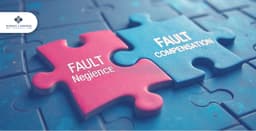
March 20, 2025
How Comparative Negligence Affects Personal Injury Claims in Florida
It all happens so fast—the screech of tires, the sudden impact, and then silence. You sit there, trying to catch your breath, trying to process what just happened. The pain starts creeping in, and so do the questions. What went wrong? Who’s to blame? And what happens next?
In Florida, the law doesn’t see things in absolutes. Fault is measured in percentages, broken down and assigned like pieces of a puzzle that don’t quite fit. Even if the accident wasn’t entirely your doing, your compensation depends on where the numbers fall. And if you don’t take control of that narrative, someone else will. So, where do you stand? And more importantly, what can you do about it?
(1) What Is Comparative Negligence?
Comparative negligence is a legal rule that determines how fault is divided among parties in an accident. Instead of one party being fully responsible, the law assigns percentages of fault to each person involved.
Here’s how it works:
If you are partially responsible for an accident, your compensation is reduced by your percentage of fault.
The more faults assigned to you, the less you can recover.
For example, imagine you’re in a car accident and suffer $100,000 in damages. If the court finds you 20% at fault, your compensation is reduced by 20%, meaning you can only recover $80,000.
Comparative negligence applies to all types of personal injury cases, including car accidents, slip and fall incidents, and medical malpractice claims. It’s a system designed to account for shared responsibility, but it can also be used by insurance companies to lower payouts. To learn more about negligence laws, visit the U.S. Department of Justice.
(2) Florida’s Shift to Modified Comparative Negligence
For years, Florida followed a pure comparative negligence rule, allowing injured victims to recover damages even if they were 99% at fault. This meant that as long as another party had some degree of responsibility, you could still receive compensation.
However, in March 2023, Florida changed its approach and adopted a modified comparative negligence system. This shift has significant consequences for personal injury claims.
Under the new law:
If you are more than 50% at fault, you cannot recover any compensation.
If you are 50% or less at fault, your damages are reduced based on your percentage of responsibility.
This means that if an insurance company or court determines you were 51% responsible for an accident, you walk away with nothing—no matter how severe your injuries are. Because of this change, fighting against unfair fault assignments is more important than ever.
(3) How Comparative Negligence Affects Different Personal Injury Cases

Comparative negligence impacts various personal injury cases in different ways. Insurance companies and defense attorneys use it as a strategy to minimize or deny claims. Let’s look at how it plays out in common cases.
(I) Car Accidents
Car accidents are one of the most common personal injury claims in Florida, and comparative negligence plays a huge role in determining settlements.
Insurance companies will look for any reason to argue that you were partly to blame. They might claim:
You were speeding, even slightly.
You were distracted, such as using a phone while driving.
You didn’t react quickly enough to avoid the crash.
Even minor details can lead to a reduction in your settlement. Having strong evidence—such as accident reports, dashcam footage, and witness statements—can help challenge unfair claims against you. For more on car accident liability, visit the National Highway Traffic Safety Administration (NHTSA).
(II) Slip and Fall Cases
If you slip and fall on someone else’s property, the owner’s insurance company might try to shift the blame onto you. They could argue:
You weren’t paying attention to where you were walking.
You ignored warning signs.
Your footwear contributed to the fall.
Under Florida’s new rules, if the court determines you were more than 50% responsible for your fall, you won’t recover anything. That’s why proving the property owner’s negligence, such as failing to clean up a spill or repair a broken step—is important.
(III) Medical Malpractice
Comparative negligence also applies to medical malpractice cases. Hospitals and doctors may try to shift blame onto the patient by arguing:
You didn’t follow post-treatment instructions properly.
You delayed seeking medical care, making your condition worse.
Your lifestyle choices contributed to the medical issue.
Since medical malpractice cases involve complex medical evidence, expert testimony is often necessary to prove that a doctor or hospital was primarily at fault. Having an experienced attorney can help counter these arguments and establish the medical provider’s negligence. To understand property liability laws, check the U.S. Department of Housing and Urban Development (HUD).
(4) How to Protect Your Claim from Comparative Negligence Arguments

Insurance companies and defense attorneys will use Florida’s modified comparative negligence law against you. Their goal is to reduce or eliminate their financial responsibility. Here’s how you can protect yourself and strengthen your case.
✔ Gather Strong Evidence
The more evidence you have, the harder it is for insurers to shift blame. Collect:
Photos of the accident scene and your injuries.
Witness statements.
Police or incident reports.
Surveillance or dashcam footage.
✔ Seek Medical Treatment Immediately
Delaying treatment gives insurers a reason to argue that:
Your injuries weren’t serious.
Your condition was caused by something other than the accident.
You made your injuries worse by not getting care sooner.
✔ Avoid Admitting Fault
Even casual statements like “I didn’t see them coming” or “Maybe I could have been more careful” can be used against you. Never discuss fault with an insurance adjuster without legal guidance.
✔ Work with an Experienced Personal Injury Attorney
A skilled attorney can:
Gather the right evidence to prove fault.
Challenge unfair fault assignments.
Negotiate with insurance companies to maximize your compensation.
Insurance companies do not have your best interests at heart. Their goal is to pay as little as possible—or nothing at all. That’s why having a legal advocate is important.
Expand your understanding with these related resources.
Maximize Your Claim with Robert J. Johnson in Florida’s Comparative Negligence System
Comparative negligence laws can make it harder for accident victims to recover full compensation. We are committed to protecting your rights and ensuring you receive the compensation you are entitled to under the law.
✔ Comprehensive Case Investigation
Establishing liability is critical in a comparative negligence claim. We gather all available evidence, including accident reports, medical records, surveillance footage, and witness statements, to build a strong case on your behalf.
✔ Defending Against Unfair Fault Assignments
Insurance companies often attempt to shift blame onto the injured party to minimize their payout. We analyze the facts, challenge misleading claims, and present clear, evidence-backed arguments to ensure liability is assessed fairly.
✔ Negotiating with Insurance Companies
We handle all communications with insurers, ensuring that your rights are protected and that you are not pressured into accepting an inadequate settlement. Our legal team is skilled in countering bad-faith tactics designed to reduce or deny valid claims.
✔ Utilizing Expert Testimony
In complex cases, we work with medical professionals, accident reconstruction experts, and financial specialists to substantiate your claim and demonstrate the full extent of your damages.
✔ Litigating When Necessary
If a fair settlement is not offered, we are fully prepared to take your case to trial. Our firm has extensive courtroom experience and will present a compelling argument before the court to maximize your recovery.
✔ Ensuring Compliance with Legal Deadlines
Florida has strict statutes of limitations for personal injury claims. We manage all filings and legal procedures to ensure that your case remains on track and that your right to compensation is preserved.
If you’ve been injured in an accident, don’t let an insurance company unfairly reduce or deny your claim. Contact us for a free consultation, and let us protect your rights.





























